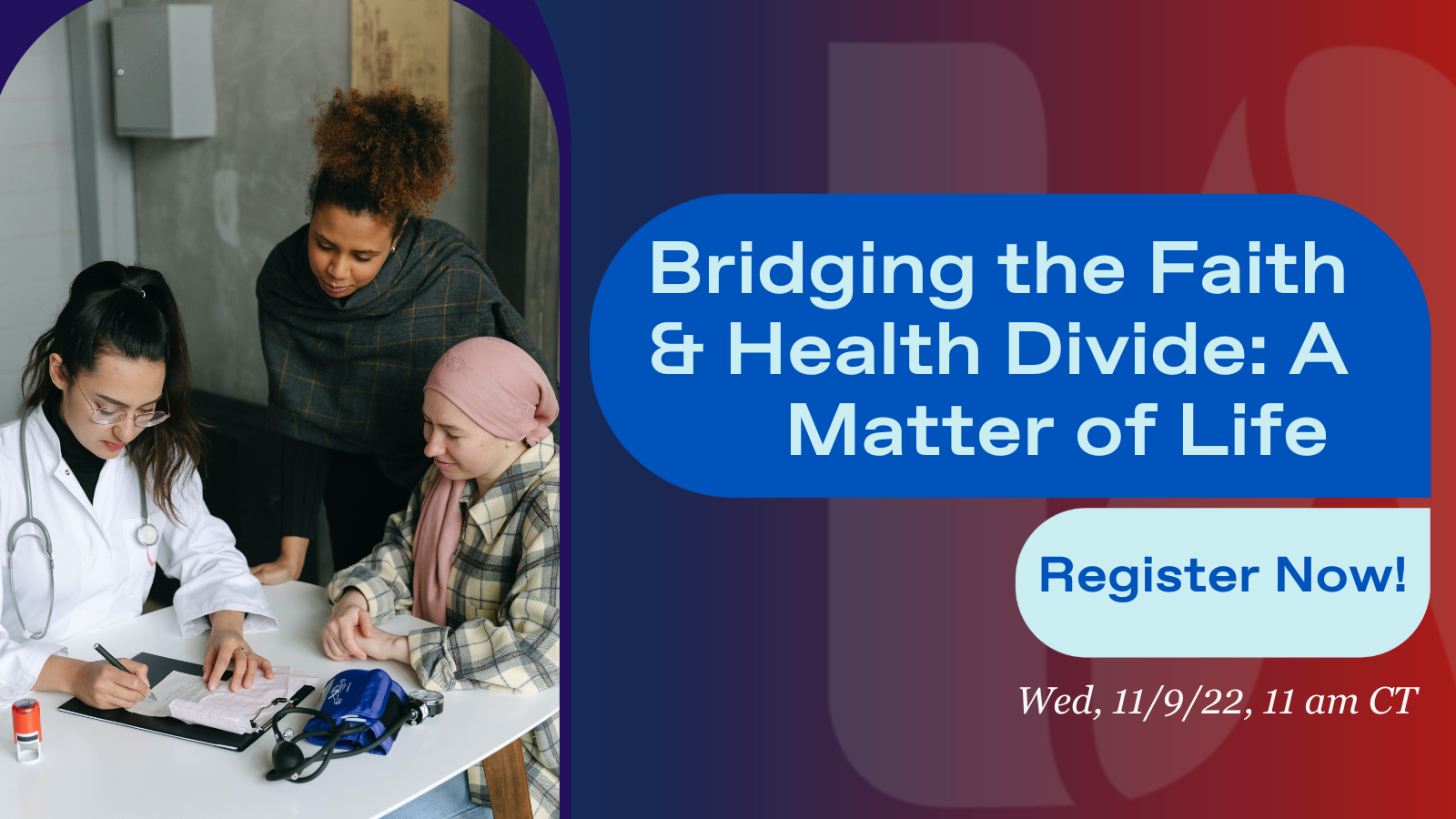How Leaders are Engaging Religious Identity in Healthcare Spaces
November 3, 2022

Throughout my life, two of my favorite moments in Shabbat services have always been the Mi Shebeirach and the Mourner’s Kaddish.
In my synagogue, both are said together, in community. I was always unsure if the prayers themselves could heal someone, likely not, but I could feel the power of the community in those moments – the reminder that we must show up for each other, and that remembering those in need would spur us into action, which can heal. In between shabbat services, my synagogue was involved in various public health initiatives: food drives, blood drives, and addressing food and prescription insecurity across the world. I was taught to heal the body and soul through community action.
When I joined Interfaith America, it was during the first wave of vaccinations for COVID-19. I got to experience people leaping into action to help their neighbors, religious leaders using their networks to arrange rides to clinics, people using religious spaces to disseminate information, showing up for their neighbors in ways that the Mi Shebeirach had always called me to do. Afterward, the ripple effects of that project were expanding in ways I could not have ever imagined – our healthcare workers, professors, students, and community members wanted to continue to address the intersection of mind, body, and soul in ways that are impactful and meaningful.
In addition to utilizing faith spaces to help heal, many of our Faith and Health grantees are striving to increase faith in healthcare settings. Our grantees worked to train pharmacists to increase their spiritual awareness, increase the understanding of the intersection between race, faith, and mental health, and teach OB/GYN students about how a patient’s faith might show up in the delivery room. We have an incredible network of educators and practitioners who are increasing the ability for patients, us, to show up as our whole selves and get cared for, fully. And the journey is not over!
Because of the calling, yearning, inclination, we have asked several of our Emerging Leaders to speak about the rich promise, even urgency, of engaging religious identity in health-related settings. We’ll hear from those working at the intersection of faith and health and connect with others committed to lifting up our nation’s religious diversity as an asset in the pursuit of personal and public health.
Share
Related Articles
American Civic Life
Higher Education
What Does Interfaith Engagement Mean from an Evangelical Perspective?
American Civic Life

Join us for the virtual event!
RegisterEmerging Leaders joining us for the conversation
- 1
Muzzammil Ahmadzada
Muzzammil Ahmadzada is a current research fellow at the NIH’s National Cancer Institute. Muzzammil holds a Bachelor of Science from Johns Hopkins University, where he studied Molecular and Cellular Biology and found his passion for the intersection of health and faith. This passion drove him to establish and direct “Anees”, a patient-visitation service conferring spiritual companionship and emotional availability to hospitalized Muslims. His interests are in medical education, health policy, health disparities, and in the intersections between spirituality and healthcare.
- 2
Laura Holford
Laura Holford, RN MSN, is an oncology certified nurse, nursing educator, and patient advocate committed to working to reduce nursing burnout and moral distress, and the reassembly of responsibility and accountability in healthcare. Liberation theology led her to train as a masters prepared nurse at University of San Francisco. She currently teaches nursing at Concordia University and works as a community health nurse.Throughout her experience as a patient facing off with a melanoma diagnosis, and chronic health disease, she became increasingly interested in the whole-person/biopsychosocial approach to health and is interested in shaping health outcomes through behavioral, social, spiritual, and emotional determinants, not only for the patient, but the caregiver as well. Combined with her background as a campus minister with InterVarsity & lay community pastor of a Christian Interfaith church, she enjoys nothing more than accompanying people on their healing, reflective, and spiritual paths. During her time as a front-line COVID RN, at the crescendo for her moral distress, she co-founded Introspective Spaces with longtime friend Dr. Anu Gorukanti, to build reflective spaces for women in healthcare. Like many mystics before her, she believes that contemplation and action cannot be separated and finds herself naturally helping others’ build reflective, imaginative, and spiritual practices to ground their action and work in the world.
- 3
Anu Gorukanti
Anu Gorukanti, MD (she/hers) is a public health practitioner, pediatric hospitalist, and co-founder of Introspective Spaces, a social venture committed to building reflective space and community for women in healthcare. She is also a member of the Sacred Journeys and Witness fellowships. She cares deeply about the well-being of her colleagues in healthcare and is passionate about healthcare reform to create equitable and compassionate care for patients and communities. In her free time, she loves to photograph landscapes, learn to dance and spend time with her wonderful husband, friends and family.
- 4
Janice D’Souza
Janice D’Souza was born and raised in South India and is professionally a mixed-methods researcher and evaluator with a focus on gender, sexual-reproductive health, religion, and social inequities. She has worked at these intersections at the CDC, NYC Department of Health, a girls’ education program in India, and other similar organizations. She also works as an evaluator with national advocacy groups on matters of safe abortion and family planning and instructs youth, parenting adults, and teachers in sex education. She has a Master of Public Health from Emory University with a focus on sexual & reproductive health and a B.A. from Berea College in Gender Studies. She is happiest reading Bollywood gossip, twisty mysteries, and in kitchens.



